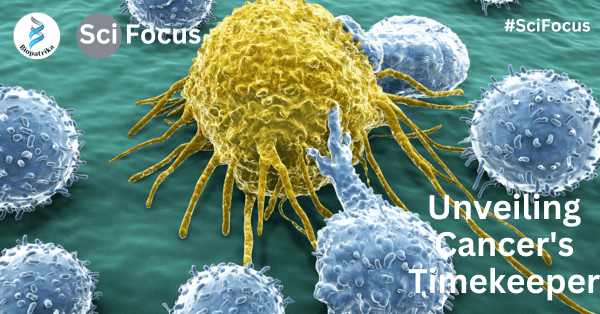Circling the Clock: Unveiling Cancer's Timekeeper
Sayan Basak | Dec 8, 2023 | SciFocus
About the author: Sayan Basak, PhD is a dedicated polymer scientist known for his work in crafting functional and stimuli-responsive polymers. His research focuses on creating innovative applications like actuators and drug delivery systems. Passionate about pushing boundaries, he specializes in stimuli-sensitive polymeric carriers for comprehensive cancer therapy. Dr. Basak encourages cancer patients to embrace life’s possibilities, believing we’re meant to shape the world.
Unveiling the Untapped Potential of Circadian Rhythms in Cancer Prevention and Treatment
- Circadian Rhythms: A Cancer Conductor
- Aligning Lifestyles for Cancer Therapy
- Chronotherapy’s Promise in Cancer Care
In the intricate symphony of cellular life, the harmonious coordination between circadian rhythms and cell cycle regulation emerges as a crucial conductor for maintaining health and homeostasis. Recent research has unveiled a fascinating interplay between these two processes, shedding light on novel possibilities for understanding and harnessing circadian rhythms in cancer prevention, treatment, and survivorship care.
The temporal regulation of cell biology is gaining recognition as a pivotal factor in optimizing cellular function, repair mechanisms, and responses to external signals. While the mechanisms governing cell cycle regulation and circadian rhythms are distinct, recent studies have uncovered both direct and indirect interactions between these intricate processes. The molecular interplay among clock components and cell cycle regulators provides valuable insights into potential molecular targets for cancer treatment, emphasizing the importance of aligning circadian lifestyles as adjuvants for cancer therapy.
Exploring the circadian regulation of neuroendocrine factors, energy metabolism, immune function, and xenobiotic metabolism presents unique opportunities to enhance treatment efficacy. When synchronized with circadian rhythms, lifestyle factors such as physical activity, sleep, and nutrition offer fresh mechanistic explanations for the impact of certain lifestyles on cancer initiation, progression, and metastasis. With nearly 41% of adults facing a lifetime risk of cancer, it becomes imperative to incorporate circadian insights into predictive models. Disruptions like shift work, even among non-shift workers, and chronic circadian rhythm disruption have been linked to increased cancer risks. These disruptions not only heighten the risk of certain cancers but also contribute to comorbidities that complicate cancer diagnosis, prognosis, and recovery.
The molecular circadian clock components, which orchestrate transcriptional and post-transcriptional steps in gene expression, exhibit rhythmicity in various tissues. Studies have demonstrated that these components engage in crosstalk with cancer-related programs, influencing critical processes such as cell proliferation, apoptosis, inflammation, metabolic reprogramming, and metastasis. The intricate interactions between circadian components, oncogenes, tumor suppressors, and cell cycle regulators underscore the significance of circadian system disruption in cancer.
Chronic circadian disruption has been implicated in the onset of diseases, including cancer. Epidemiological and controlled animal studies point to an increased risk of breast and prostate cancers due to circadian disruption, especially in scenarios involving shift work. Furthermore, light pollution and insufficient daylight exposure contribute to circadian disruption, creating conditions that promote cancer growth in animal models.
The complex relationship between circadian rhythms and cancer development becomes even more apparent in preclinical models demonstrating accelerated tumor growth and increased metastasis under chronic jet lag conditions. The tumor microenvironment (TME), comprising various cellular and non-cellular components, plays a pivotal role in cancer progression. Circadian disruption has been shown to alter the interaction between cancer cells and the TME, creating conditions that favor tumor development and progression. Studies reveal the central role of circadian rhythms in regulating cancer cells and their interaction with the TME, impacting inflammation, immune response, and metastasis.
Recent advancements in chronotherapy, a treatment approach based on circadian rhythms, hold promise in cancer prevention and treatment. Strategies such as “training the clock,” “drugging the clock,” and “clocking the drugs” offer innovative avenues for enhancing anticancer therapies. Lifestyle interventions, including time-restricted eating, exercise, and light therapy, show the potential to synchronize circadian rhythms and improve treatment outcomes.
The intersection of circadian rhythms and cancer biology opens a new frontier in understanding, preventing, and treating cancer. As we delve deeper into the complex relationships between the circadian clock and cancer, personalized circadian medicine may emerge as a powerful tool in the fight against this formidable disease. The untapped potential lies in discovering novel therapeutic targets and optimizing lifestyle interventions to enhance the effectiveness of existing cancer treatments. Through continued research and exploration, we may unlock the full scope of circadian rhythms’ impact on cancer and pave the way for personalized and precise circadian medicine.
Further readings:
- Savvidis, C., & Koutsilieris, M. (2012). Circadian rhythm disruption in cancer biology. Molecular medicine, 18, 1249-1260.
- Gery, S., & Koeffler, H. P. (2010). Circadian rhythms and cancer. Cell cycle, 9(6), 1097-1103.
- Zhou, L., Zhang, Z., Nice, E., Huang, C., Zhang, W., & Tang, Y. (2022). Circadian rhythms and cancers: the intrinsic links and therapeutic potentials. Journal of Hematology & Oncology, 15(1), 1-31.
Thank you for being part of the Biopatrika community dedicated to “Bringing Science to Society.” We appreciate your engagement and support as we share noteworthy news, trends, biotech startup picks, industry analyses, and insightful interviews with KOLs.
For partnership or advertisement opportunities, feel free to contact us here or visit www.biopatrika.com.
If you’re enjoying the newsletter, consider subscribing to join over 3.8K+ readers on LinkedIn. Help us expand our reach by sharing it with your colleagues and friends: https://www.linkedin.com/newsletters/biopatrika-6915078341121191936/
Don’t forget to explore our YouTube channel, where we delve into science journeys, mentorship, and career-related content: Biopatrika YouTube Channel | SciKonnect Podcast
Thank you for being part of our mission to bridge the gap between science and society.
Career Opportunities: Biopatrika Career Hub https://www.linkedin.com/groups/13946324/
Follow Virender Singh and Biopatrika on LinkedIn.
Biopatrika: Bringing Science to Society
© Biopatrika 2023 All Rights Reserved.

